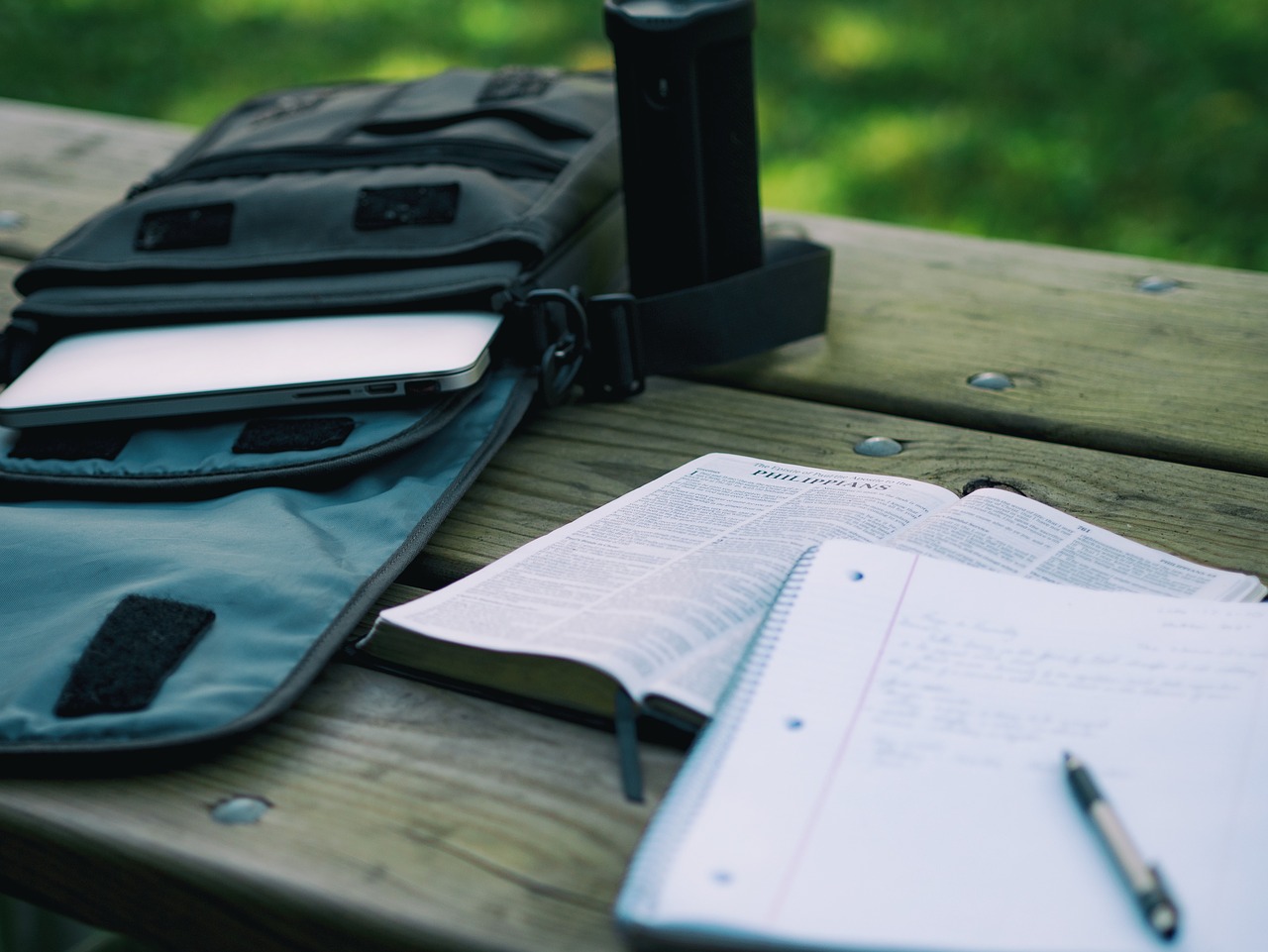Are you starting the New Year with a renewed effort to read your Bible regularly? If you are here are some dangers that you should be aware of. While certainly reading your Bible is a good thing, it can also be a dangerous thing if you are not careful. And, no I’m not talking about dangers of how it could turn your life upside down with its radical truths. That’s a good danger that I certainly hope it happens as a result of your Bible reading.
The dangers I’m talking about are real spiritual dangers. They are dangers that most often slip in quietly and nearly unnoticed before causing great damage to your spiritual life. These dangers can undermine your efforts towards spiritual growth and leave you spiritual malnourished despite a force fed diet of Scripture.
So before you wade into to the depths of Scripture let’s identify these dangers and see if we can’t find some way to avoid them so that our Bible reading will always be a succulent life giving aspect of our spiritual walk.
 Danger #1 “Check it off the list”
Danger #1 “Check it off the list”
If you’re goal oriented this one can be a real killer of your spiritual life. While it’s good to have a goal to read the Bible daily, that goal can become bad when achieving that goal becomes your main purpose and motivation. What happens when your Bible reading goal rises in significance above the real spiritual motivations for reading God’s Word? Quite frankly your Bible reading turns into a nasty form of legalism.
You say, “But at least I’m still reading the Bible every day” and I say, “As long as your main goal is to ‘check it off your list’ it’s not going to do you a bit of good!”
In fact it may even do you more harm than good! You have turned Bible reading into a legalistic practice that is trying to please God (and sooth your own conscience) through empty ritual. God’s Word is clear, you can not pursue righteousness through the stringent keeping of rules.
Why?
First, because you are not able to keep all those rules no matter how hard you try. Second, as soon as you turn something like daily Bible reading into a purely mechanical practice you have lost it’s main purpose. You have turned Bible reading into a faithless recitation of phonemes and syllables which have no power or strength to change the condition of your eternal soul.
How can you avoid the checklist danger?
As we approach our Bible reading we must strive to keep the Biblical motivations for reading Scripture central. Below are a few of the main motivations for Bible reading as I see them. This is not an exhaustive list, I’m sure you could add to it.
Reasons to read the Bible:
- To know Jesus. (2 Tim 3:15)
- To deepen our faith. (Rom 10:17)
- To keep us from sin. (Psalm 119:11)
- To give us direction in life. (Psalm 119:105)
- To bring joy and great reward. (Psa 19:8-11)
If you can keep some of these vital reasons for studying God’s Word in mind every time you open your Bible it may help you avoid the temptation of turning your daily reading into a race to check the task off your list. Instead, as you read, keep these purposes in the back of your mind.
Ask yourself: “How is this helping me know Jesus better? How is this deepening my faith? How is this convicting me of sin? How is this giving me direction in life? How is this bringing me joy?”
Danger #2 “False guilt”
You set out at the beginning of the year to read the Bible every day. You committed to reading x amount of chapters or studying God’s Word for x amount of minutes each day. Then it happens, some how a day slips by and you realize that you didn’t read the your Bible. You feel guilty as if you’ve let God down, maybe he will punish you for your lapse in daily Bible reading.
The danger of false guilt is often related to the “checklist” method, it results from a legalistic approach to Bible reading. Maybe it’s the pressure you feel from your church or from a mentor, maybe it’s simply self-inflected pressure that you put upon yourself. Either way we must understand that there is no hard and fast Bible reading rule found in Scripture. There is no commandment that says, “Thou shalt read my Holy Word every morning from 7:30-8:00.”
God does not give us specifics about the time of day, how many minutes, or how many chapters we should read each day. When it comes to these details, we have freedom to decide for ourselves. On the other hand God does give us reason to strive to study his Word often and regularly. Passages like Psalm 1 talk about meditating on God’s Word day and night. Peter also tells us to desire God’s Word like babies desire milk (1 Pet 2:2) and Paul exhorts Timothy to study Scripture in order to be an approved workman (2 Tim 2:15).
Our goal should be to constantly deepen our understanding of God’s Word. One of the best ways to do that is through daily Bible reading, study, and mediation. This however, is a means, not an end. We should not turn it into a legalistic burden for ourselves or for others. If we miss a day, I don’t think God is up in heaven saying, “I can’t believe Caleb didn’t read his 5 chapters today!”
Remember, Jesus taught that his burden was light and that his yoke was easy (Mat 11:29-30). So instead of feeling guilty about missing a day, just get back on the horse as soon as you can, not because you’re guilt tripped into it but because you want your faith to grow and you want to know God better today than you did yesterday!
 Danger #3 “Failure to apply”
Danger #3 “Failure to apply”
One of the main reasons you should read your Bible is for real life change and in order to do that you must make a regular practice of daily applying the truths you find in God’s Word to the details of your personal life.
James gives us no nonsense instruction here:
“But become doers of the Word, and not hearers only, deceiving your own selves.” Jas 1:22
While this seems to be a simple task, it is often not as easy as it looks. As fallen humans we like to be very specific when it comes to applying Biblical truth to the lives of others. We read a passage and think:
“Dave really needs to read this so that he can finally understand how greedy he’s being by buying that new car.”
or
“Maybe I’ll text this passage to Bev so she can see how much she hurt me when she said, ________”
What confident and unmistakably clear insight God has given us into the lives of others! The problem is that we are often nearly blind when it comes to applying those same truths our own lives. The clarion call for specific application and action in the lives of others often turns into generalizations of abstract spiritual truth when the attention is turned back on us.
When asked:
“What applications did you take away from your Bible reading today?”
The answers we give for ourselves can often look like this:
“I need to trust God more.”
“I realized that I need to be more disciplined with my time.”
“God showed me that I need to love others more.”
While these are all valid applications, they remain obscure, undefined, and as a result often unapplied in our lives. Notice what the author of Hebrews says about the power of God’s Word.
For the Word of God is living and powerful and sharper than any two-edged sword, piercing even to the dividing apart of soul and spirit, and of the joints and marrow, and is a discerner of the thoughts and intents of the heart. Neither is there any creature that is not manifest in His sight, but all things are naked and opened to the eyes of Him with whom we have to do. Heb 4:12-13
To allow God’s Word to dig into the private depths of our heart, to uncover hidden and favorite sins, to show us our faults, to open up wounds from long ago, these are never pleasant things and our human nature will do everything possible to avoid it. However, good Biblical application isn’t an option for the Christian, it is a must. It is something we must intentionally strive for daily as we dig into God’s Word. If we are not vigilant in the task we will soon slip back into vague personal application and God’s Word will lose it’s power to change our hearts.
Here are a few things you can do to make sure you are applying God’s Word specifically and personally.
- Approach God’s Word with a humble and broken heart: Read Psalm 51
- Ask God to search you and to lead you: Psalm 139:23-24
- Spend some time meditating on the truths you have read and look for specific applications.
Danger #4 “Personal revelation method”
I once heard someone say that God’s Word is a love letter to you. That sounds very nice and it would be lovely if it were true, but it’s not true. Don’t crucify me just yet, let me explain. You see the Bible was not personally written to you or me, it isn’t a personal revelation of God specifically to us. Yes, God had you in mind when he sovereignly inspired the authors of Scripture, yet each book had a specific audience that lived within a certain culture and time.
What we find in the Bible is not a “love letter” to us but rather all kinds of literary genre written to all kinds of people living during many different time periods. To turn the Bible into personal revelation specifically for me is both a self-centered approach and a flawed way to look at God’s revelation to mankind.
As you open each new book in the Bible take a careful look at a good commentary and read the introduction to the book that you find in the commentary. This will often help you better understand the time, culture, author, original readers, and specific problems that the book addresses. While the Bible is not “personal revelation” to you it does have very personal application of its truths to everyone who reads it.
 Danger #5 “Hunt and peck”
Danger #5 “Hunt and peck”
To “hunt and peck” is to read the Bible with no particular system or plan in place, it’s like trying to get from point “A” to point “B” without a map or a compass. Instead of making real progress you’ll just waste your time milling around in this or that passage of Scripture.
Why do you need a plan? If your goal is spiritual growth and real life change then it’s important that you expose yourself to the whole truth of God’s Word. Spending all your time in one book or even in several books of the Bible can leave you with a warped view of God’s overall revelation. Without a plan we will generally stick to reading those sections of Scripture that we find most interesting or pleasing to us and stay away from those areas that may be hard to understand or convict us of certain sins.
I recommend checking out this list of free reading plans from Bible Gateway.
Danger #6 “Skim the surface”
Too often our daily reading can be nothing more than skimming the surface. We fail to take an extra few minutes to dig a little deeper for greater understanding and insight into what the passage is really saying. Unfortunately, we get used to certain passages of Scripture, we think we already know what it says, we assume that we have all the answers and we understand the meaning. Sometimes it’s the most familiar passages that we skim over the quickest, sometimes it’s the difficult and boring passages that we skim over.
If you find that you are skimming the boring parts of the Bible you should check out these recommendations by Nancy Guthrie on how to view these parts of the Bible.
If you find that you are skimming on the familiar parts of the Bible then I recommend that you stop and ask yourself some questions concerning these parts of the Bible.
Ask yourself:
- Who are the main characters?
- What action is being done and why?
- How does this relate to the larger context, chapter, book?
- What does this text tell me about the character of God?
- What does this text tell me about man?
- How would I react in the same situation?
- What would this story look like in contemporary society?
These questions along with some good Bible study tools will often help you see those familiar passages with new eyes.
Danger #7 “Distracted reading”
This final danger is one that I am often guilty of. A notification pops up on my phone and without thinking I check it, then I decide to quickly respond, 15 minutes later I realize that I’m nearly out of time and I have barely started my Bible reading.
Sometimes it’s not technology but just a wandering mind. I usually read the Bible in the mornings and sometimes my mind is already thinking about what I need to do that day and how I can get it all done.
What’s the solution to these distractions? Technology is a simpler problem than that of a wandering mind. If your phone is distracting you then turn it off, put it in the other room, or put it on “do not disturb” until you’re done with your Bible reading.
As for the wandering mind, there are a couple of things I find helpful.
- Prayer: Specifically asking God to help you focus your mind before you start is not only a powerfully prayer but also serves as a good reminder for you that your mind needs to be on God’s Word now.
- Often the wandering mind comes from our worries and cares for the day. Decide to give these worries to God before you start and exercise your trust in God’s sovereign control.
- Find a place and a time that is less likely to distract you. For me this is early morning in our kitchen, as far removed from the rest of the family as possible. You must decide what place and time works best for you.
- If your mind starts wandering during your Bible time, stop for a moment, pray and then go back to your Bible study with renewed focus.










Bernard Haynes
January 4, 2017Excellent post Caleb. I fall victim to dangers 6 & 7.
Caleb
January 5, 2017Truth be told, I have experienced all of these! I hope you found the suggestions helpful.
TCAvey
January 5, 2017This past year I’ve worked on #3. Asking God to show me areas I need to mature in Him…specifically I’ve prayed for help walking in the Spirit. I’ve been in awe of how He has opened my eyes to my behaviors and responses to situations. How I act first, and pray later. I’ve a long way to go, but God is working in me and I’m so thankful He is patient and kind.
I really like what you said in #4. I think many don’t see the cultural application to our society as it relates to the Bible. I love history and current events. Therefore there are times I read the Bible and see correlating themes between Biblical times and now: I see the hand of God in the Bible and can see it in our world now. It’s sad when I try discussing it with other Christians but they either don’t care or have no comprehension of what I’m trying to say. Not saying I’m “right” or smarter or anything. I hope it doesn’t sound that way.
Dan Black
January 20, 2017Great dangers Caleb! I think many of us read the Bible just to check it off our list. I know I’ve fallen into the trap before. We should read our Bible to get to know and stay connected with God.
Caleb Suko
January 20, 2017Exactly, it’s an easy thing to fall into.